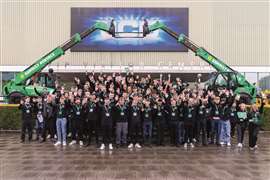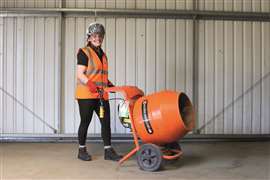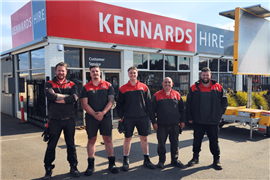How can rental companies tackle the recruitment crisis?
21 October 2024
IRN looks at how companies are tackling worker shortages, and increasing retention rates.
 Sunbelt Rentals UK said it has committed to being an inclusive employer.
Sunbelt Rentals UK said it has committed to being an inclusive employer.
In part one of this feature, we spoke with a number of rental companies around the world to gain insight into what the main recruitment and retention challenges are that the industry faces.
Although responses varied, a common theme emerged: the industry struggles to recruit and retain younger workers, women, and technically skilled employees.
It also highlighted that many people are seemingly leaving the industry to pursue careers that offer them better career progression, increased pay and better work-life balance.
Of course, knowing the reasons behind the retention and recruitment puzzle is only half the battle. With that in mind, how are rental companies aiming to tackle shortages?
Expanding the recruitment drive
In the case of UK-based rental company Speedy Hire, it is aiming to have at least a 30% female workforce by 2030. “We’re working hard to achieve that,” chief people officer Ellie Armour tells IRN.
 Speedy is aiming to have at least a 30% female workforce by 2030.
Speedy is aiming to have at least a 30% female workforce by 2030.
The company, which follows the UN’s Women Empowerment Principles to advance gender equality and women’s empowerment in the workplace, said it aims to be a Top 100 Place to Work in the same timespan.
“As part of our ambition to have a 30% female workforce by 2030, we’re also looking at maternity and paternity leave policies to ensure that the best support is in place for new parents whilst they are on leave and when they return to work.”
At the same time, Sunbelt Rentals in the UK said it is “about inspiring the next generation and showing them the opportunities available in our industry.”
To reach the younger demographic of workers, the company is involved in a number of initiatives, including Open Doors, which takes people behind the scenes to showcase the range of careers available in construction.
As part of that, the company welcomes students from a number of schools across the UK to allow the opportunity to get a preview of its operations, participate in interactive tours and learn more about project management.
The company said it also attends job fairs to raise the profile of itself and the industry among potential employees, colleges and schools.
“On top of that, we’re committed to being an inclusive employer and we’ve just committed to working towards an inclusive employer accreditation from ‘inclusive companies’, which is something we’re really proud of,” says Charlotte Bennett, UK & Europe people director, Sunbelt Rentals UK.
“Our people are at the heart of what we stand for, and we want everyone to feel welcome and valued here, so we’re constantly working to create an environment where everyone can thrive.”
Elsewhere, GAM Rentals in Spain said it participates in external initiatives such as the European Rental Week with the aim of promoting rental in Europe.
In addition, the company has specific activities to attract and retain staff, such as talks at educational centres, internship and scholarship schemes with different universities and agreements with associations to promote the inclusion of specific groups in the labour market.
Improving the work-life balance
Kennards Hire in Australia was one of a number of companies that highlighted work-life balance as a potential reason that people leave the equipment rental sector.
 Kennards Hire has reduced the working hours of its operational roles without reducing pay. Photo: Kennards Hire
Kennards Hire has reduced the working hours of its operational roles without reducing pay. Photo: Kennards Hire
With the aim of tackling that, the company introduced a 40-hour working week in 2023, down from its previous total of 45.
“Whilst we already offered workplace flexibility, the primary contracted weekly hours for operational roles was 45,” says Sally Craig, general manager, people & culture.
“We made a business decision to reduce the working hours of our operational roles, whilst not reducing pay. This has significantly improved retention and overall engagement across the business in a time when work-life balance is a priority for many.”
In June this year the company also introduced its Employee Value Proposition (EVP), ‘With Kennards Hire You Can’, which is based on three principles: Trust in Each Other; Lead in Many Ways; and Grow Your Expertise.
The new strategic engagement platform enables the company to engage with prospective employees about why they should work with Kennards Hire and current team members about why they should stay with the company.
“We want people to know our commitment to them and what they can expect when they work here,” says Craig.
Meanwhile, the company has also introduced an employee referral program, which is designed to encourage employees to refer someone they believe will be a good fit. Craig adds, “They receive an AU$1000 payment for any successful hire. It’s a great incentive for our team, whilst providing us with qualified candidates.”
Like Kennards Hire, Speedy has also committed to offering employees a better balance with its Speedy Work Life Balance scheme, which offers flexible working in the form of nine-day fortnight, a 4.5-day week and/or early and later start/finish times.
The company said that the scheme enables employees to balance their time between home, travel and the office in a way that works for them.
Going further, the company also offers employees shares in the company, which it said gives them a “vested interest” in ensuring its growth and success.
Working together
Another way for companies to fill the skills void which has been left by older generations leaving the industry is through mentoring and training initiatives.
In that respect, Speedy is currently running a pilot Mentoring and Skills Transfer Programme, an initiative that pairs its employees that are either at the latter end of their careers or who are well established in their careers with apprentices to facilitate practical and theoretical two-way sharing of knowledge and experience.
All employees acting as mentors are provided with mentor training from the company’s People Development team as well as being offered additional incentives tracked against their respective apprentice’s progress.
In the case of GAM, the company said that through its Kirleo vocational training school that specialises in the industrial sector, it offers “continuous training to improve the professionalisation of positions where formal training does not reach.”
 Mauro Mollo, Mollo Group’s president.
Mauro Mollo, Mollo Group’s president.
Italy-based Mollo Nolleggio is also focusing its attention on training. In 2013 it launched the Mollo Academy, which as well as providing training courses to customers on the safe use of work equipment, It also offers internal staff training across a number of segments, including commercial, technical and administrative.
Mauro Mollo, Mollo Group’s president, said, “It is very important, investing in your employees through targeted training.
“This must be done by integrating new tools and innovative technologies into these training courses, in order to respond to the needs of a constantly changing market.
“Furthermore, investing in their employees through training is a concrete way to show confidence to the, improve their skills and value them as professionals.”
Back in the UK with Sunbelt, the company told IRN that raising the profile of the rental industry is crucial in staff retention and recruitment, both from an internal and external perspective.
It said that to meet the challenges facing the industry, companies must work together to improve the entire landscape.
According to Bennett, expanding diversity and inclusion plays a big role in this; “We must ensure we’re welcoming people from all backgrounds by creating an inclusive environment where everyone feels they belong and can thrive.
Bennett adds, “We need to show that there are fantastic roles and future career paths available in this industry for a diverse range of people.
“This involves supporting initiatives that build our brand and highlight what the rental industry is all about.”
Development focus
In its sustainability report for the 2023 financial year, Nordic-based rental company Renta Group said it increased its workforce by 22% from the previous year, reaching 2,091 employees.
In terms of diversifying, the company said its objective is to “cultivate, attract, embrace, retain, and develop a diverse and talented workforce.”
On a Group level, the company has set out a goal to have a “more equal gender distribution between females and males by the end of 2026.”
At the same time, it said that it prioritises the “continuous development of staff” through a combination of both internal and external training, which comprises of a wide range of topics, including data security, anti-corruption, leadership development and specialised skills such as truck driving for specific roles.
In 2023, the average training hours per employee totalled 14 hours for male employees and 3 hours for female employees.
Rebecca Långström, head of sustainability, said, “Over the past year, we have continued our work to implement our ESG strategy into all aspects of our operations. By applying a holistic approach to our economic, social, and environmental performance, we strive to create long-term value for our stakeholders, including customers, employees, and investors, as well as society at large.
“During the year Renta implemented a checklist with ESG actions to approach sustainability in an efficient and strategic way and promote exchange of experiences between segments. A process to further improve the supply chain management was initiated, by introducing a purchase guideline and a supplier assessment system.”
STAY CONNECTED



Receive the information you need when you need it through our world-leading magazines, newsletters and daily briefings.
CONNECT WITH THE TEAM






